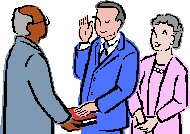 So, what does it mean to be estopped? According to my copy of Black’s Legal Dictionary, Seventh Edition, “estoppel” is “[a] bar that prevents one from asserting a claim or right that contradicts what one has said or done before or what has been legally established as true.” That says it pretty well, but it doesn’t say it in my words: “Under certain circumstances, it doesn’t matter if something was true or false – if you said it was true, then, as far as you are concerned, you can’t later say: ‘it was false’ – if you said it was false, then, as far as you are concerned, you can’t later say: ‘it was true’.”
So, what does it mean to be estopped? According to my copy of Black’s Legal Dictionary, Seventh Edition, “estoppel” is “[a] bar that prevents one from asserting a claim or right that contradicts what one has said or done before or what has been legally established as true.” That says it pretty well, but it doesn’t say it in my words: “Under certain circumstances, it doesn’t matter if something was true or false – if you said it was true, then, as far as you are concerned, you can’t later say: ‘it was false’ – if you said it was false, then, as far as you are concerned, you can’t later say: ‘it was true’.”
What are those circumstances? One is that a person holding your statement against you believed you and it was reasonable for the person to do so Another is that the person changed a relevant position based on your statement and you knew that the person would or might reasonably do so. And, the person was harmed because the facts were different than you said they were. There needn’t have been any consideration for giving the statement in the first place. This isn’t a matter of contract law. The estoppel doctrine is an equitable one and the statement could have been made within or outside of a contract or a contractual relationship. [Read more…]
Print

Recent Comments